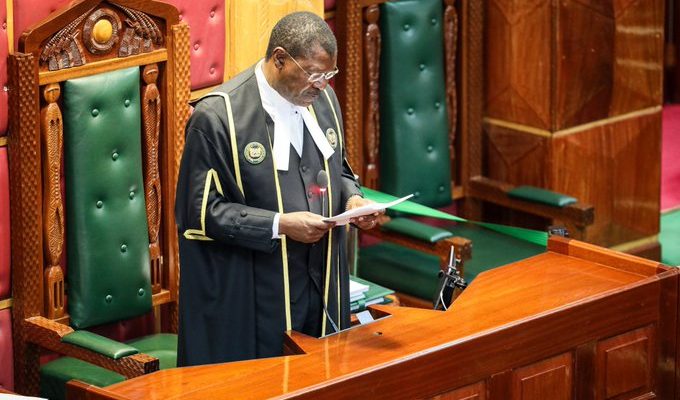By Kelly Mumbi
The Speaker of the National Assembly, Moses Wetangula, has issued a notification to members and the public concerning the President’s Memorandum on the Finance Bill, 2024. The Memorandum has been referred to the Departmental Committee on Finance and National Planning for prompt review where the committee must consider the President’s reservations and recommendations and report to the House at its next regular sitting.
Regarding the next steps after receiving the President’s Memorandum on the Finance Bill 2024, the Speaker has provided an explainer on the procedure and implications of the Bill’s rejection on the FY 2024/25 budget.
Article 115 of the Constitution allows the President to send a Bill back to Parliament with reservations for reconsideration. Parliament must then address these reservations as outlined in the Article.
The President’s Memorandum recommends deleting all sixty-nine clauses of the Finance Bill 2024 effectively rejecting the entire Bill.
If the National Assembly approves the President’s reservations, the Bill is lost. To negate the President’s veto or revive any clauses, a two-thirds majority vote (233 members) in the National Assembly is required, as per Article 115(4)(a).
After receiving the President’s Memorandum, the Speaker must refer it to the Departmental Committee on Finance and National Planning, which will report back to the House. If the Committee fails to report at the next sitting, the House will consider the Memorandum as a whole.
The Committee and House must consider that the President’s recommendation to delete all clauses reflects the public’s rejection of the Bill.
Standing Order 42(3) mandates that the Speaker transmits the President’s message to all members and reports it on the next sitting day. The National Assembly is on a short recess until 23rd July 2024, when the Committee must report on the Memorandum.
The Finance Bill, 2024 cannot become law through the passage of time since it has been referred back for reconsideration.
The Budget includes expenditure estimates, which translate into an Appropriation Bill for passage by the National Assembly. Revenue projections, derived from existing and proposed tax measures in a Finance Bill, support the Budget. The Finance Bill consolidates various tax measures to raise additional revenue.
The rejection of the Finance Bill, 2024 creates a Kshs. 300 billion financing gap between approved expenditure and projected revenues.
The new fiscal year starts on 1st July 2024. The Appropriation Bill authorizing the withdrawal of funds from the Consolidated Fund is distinct from the Finance Bill and has already been passed. The financing gap can be addressed by reducing approved expenditure through a Supplementary Appropriation Bill.

